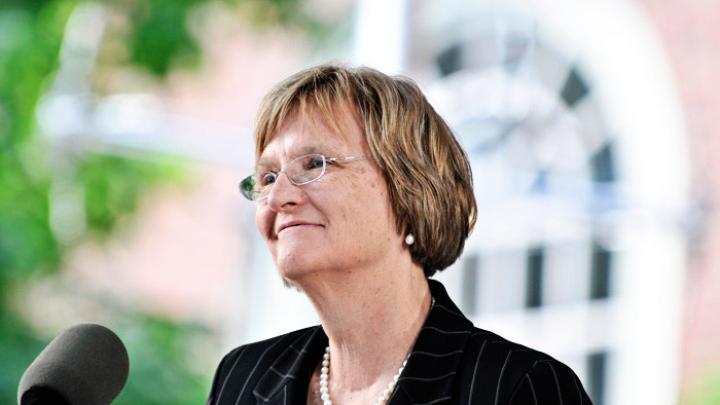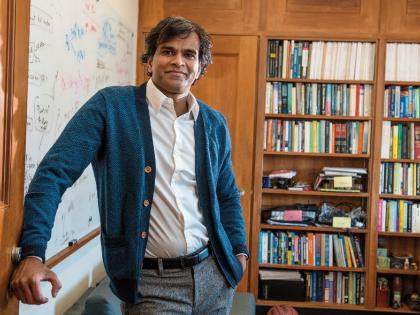In her Commencement afternoon address, President Faust donned her historian’s hat to put the University’s interest in public service in context. She began by introducing herself as the “warm-up act” to the next speaker, himself recently retired from a career of public service.
I intend to…explor[e] with you for the next few minutes a set of long-held values and commitments to which we at Harvard have devoted particular attention this year. These commitments are in fact those that Justice Souter’s life and accomplishments exemplify….I speak, of course, of Harvard’s long tradition of public service, going back to our seventeenth-century roots.
The University’s founders described the arc of education as one that moves from self-development to public action. John Cotton, a prominent figure in Harvard’s founding, wrote, “God would have [a man’s] best gifts improved to the best advantage.” But the student, he continued, would also “see that his calling should tend to public good.”
This prescription, articulated nearly four centuries ago, captures with remarkable fidelity a fundamental purpose of the modern research university, the development of talent in service of a better world. This commitment is at the heart of all we do--and at the heart of what we celebrate today as we mark the passage of more than 6,000 graduates from our precincts into wider realms of challenge and achievement. We have equipped them, we trust, with the abilities, in the words of Charles William Eliot, to go forth “to serve better thy country and thy kind.” We hope that we have equipped them as well with the capacity to lead fulfilled, meaningful, and successful lives.
Yet not infrequently, these missions of private accomplishment and public duty have been seen in tension. Phillips Brooks, for whom the Phillips Brooks House for social service is named (and this is a place where Justice Souter spent time as an undergraduate), once remarked, “We debate whether self culture or our brethren’s service is the true purpose of our life.” But, he determined, the two must coexist, in a creative balance in which we develop our talents in order to share them. Brooks concluded that while, as he put it, “No man can come to his best by selfishness…no man can do much for other men who is not much himself.”
In the mid twentieth century, John F. Kennedy worried about the potential conflict between “the public interest and private comfort.”…Yesterday, I attended the commissioning of ROTC cadets who are likely to find themselves soon serving the public interest in the considerable discomfort and danger of the war zones of Afghanistan and Iraq.
For these students, however, service represents not sacrifice, but the most important form of fulfillment--in which one’s talents can be harnessed for purposes transcending one’s own individual life. A.J. Garcia, who worked in the president’s office during much of his undergraduate career, is now with Teach for America in the Rio Grande Valley of Texas. He reports, “It is possibly the hardest thing I’ve ever had to do in my life, but by far the most rewarding. At the end of every day, I might leave work mentally, emotionally, and physically exhausted, but it is the best type of exhaustion and…well worth the impact of closing the achievement gap one child at a time.”
…But universities, their faculty, and their students play another important role in contributing to the public good. And that is through engaging those remarkable minds in discovering solutions to those biggest problems--solutions that will close the achievement gap--so we don’t have to address it one child at a time, solutions that will help deliver health care, address climate change, resolve ethnic conflict, and advance post-disaster recovery.
I would like to imagine that whatever career our graduates pursue, whether in the private or the public realm, they will choose to make service an ongoing commitment.
We as a university live under the protections of the public trust. It is our obligation to nurture and educate talent to serve that trust--creating the people and the ideas that can change the world.…Now, as Cotton did nearly four centuries ago, we charge you, in your varied fields and callings, to, in Cotton’s words, “tend to public good.” We and the world need you.








